Business Administration: Negotiation Strategy Report Analysis
VerifiedAdded on 2020/10/23
|12
|3659
|486
Report
AI Summary
This report delves into the intricacies of business negotiation strategies, providing a comprehensive overview of the key elements involved. It begins by describing the requirements of a negotiation strategy, emphasizing the importance of understanding objectives and preparing for various scenarios. The report then explains the use of different negotiation techniques, such as sticking to principles and fostering open communication, while also highlighting the significance of researching the other party to gain insights into their strengths, weaknesses, and objectives. Furthermore, the report explores how cultural differences can affect negotiations, emphasizing the need for awareness and adaptation. It identifies the purpose, scope, and objectives of negotiation, and explains the scope of one's own authority. The report outlines how to prepare a negotiating strategy, including fall-back stances and compromises. It also covers assessing the likely objectives and negotiation stances of the other party, and maintaining accurate records of negotiations. The report concludes by emphasizing the importance of adhering to organizational policies, procedures, and ethical requirements during business negotiations.
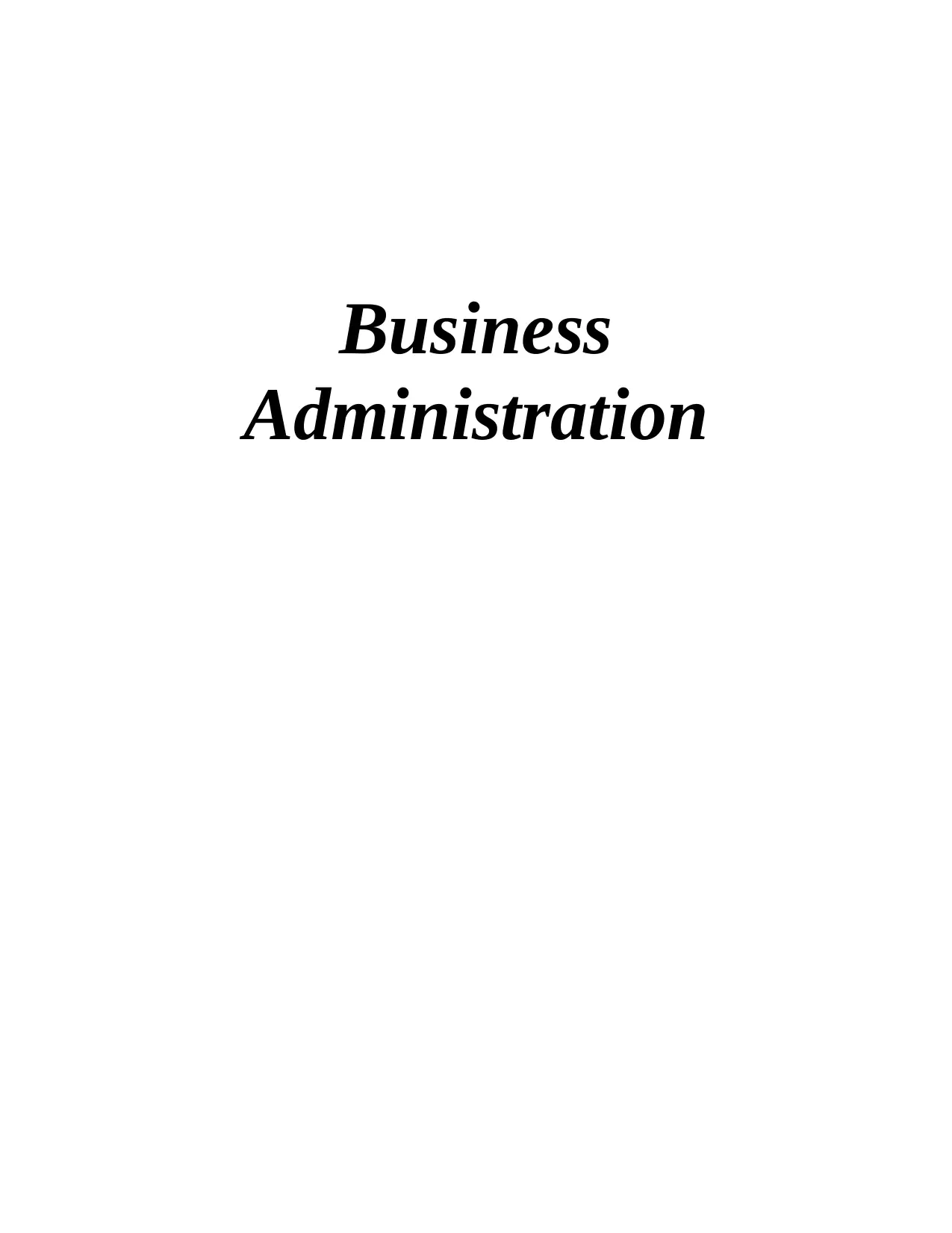
Business
Administration
Administration
Paraphrase This Document
Need a fresh take? Get an instant paraphrase of this document with our AI Paraphraser
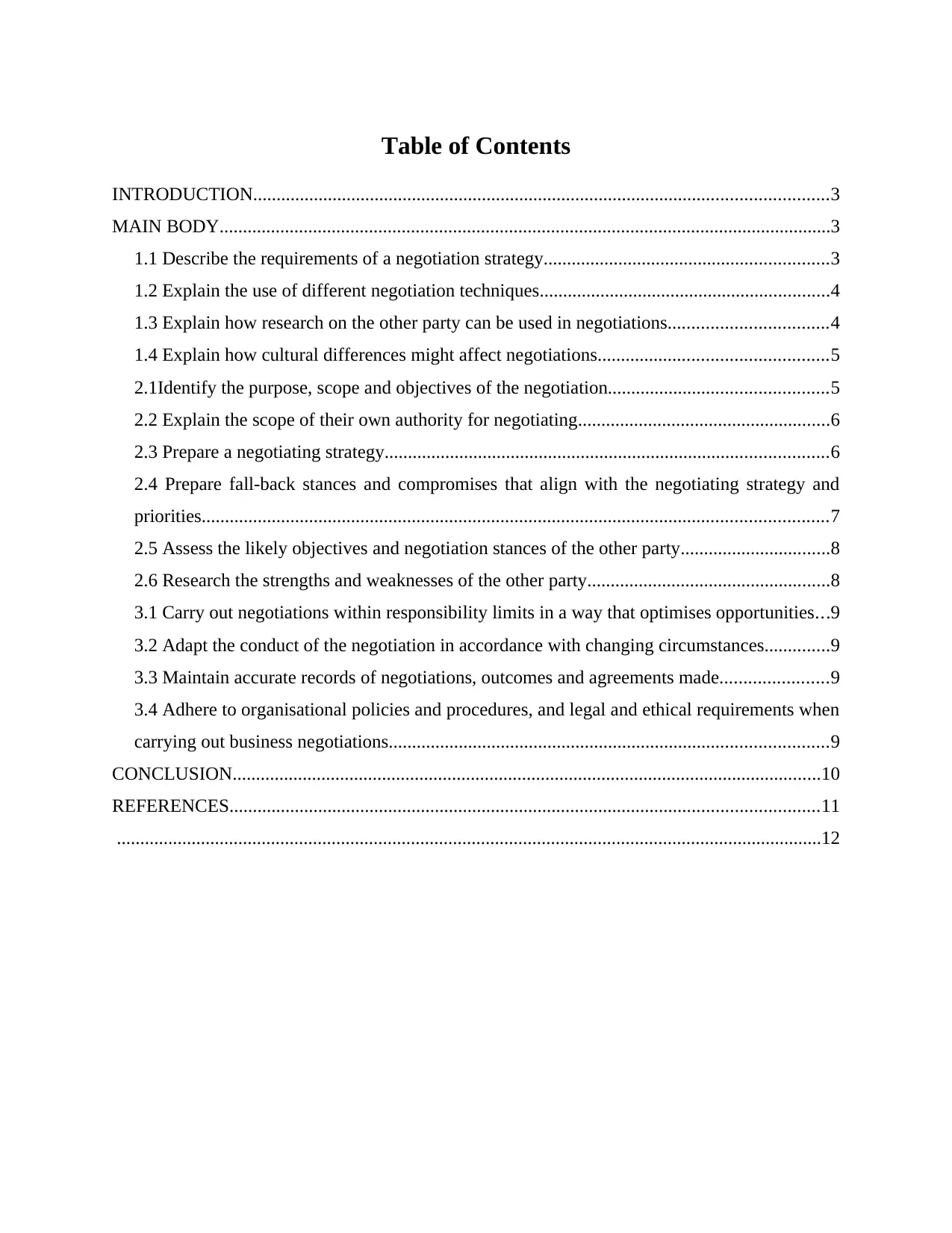
Table of Contents
INTRODUCTION...........................................................................................................................3
MAIN BODY...................................................................................................................................3
1.1 Describe the requirements of a negotiation strategy.............................................................3
1.2 Explain the use of different negotiation techniques..............................................................4
1.3 Explain how research on the other party can be used in negotiations..................................4
1.4 Explain how cultural differences might affect negotiations.................................................5
2.1Identify the purpose, scope and objectives of the negotiation...............................................5
2.2 Explain the scope of their own authority for negotiating......................................................6
2.3 Prepare a negotiating strategy...............................................................................................6
2.4 Prepare fall-back stances and compromises that align with the negotiating strategy and
priorities......................................................................................................................................7
2.5 Assess the likely objectives and negotiation stances of the other party................................8
2.6 Research the strengths and weaknesses of the other party....................................................8
3.1 Carry out negotiations within responsibility limits in a way that optimises opportunities...9
3.2 Adapt the conduct of the negotiation in accordance with changing circumstances..............9
3.3 Maintain accurate records of negotiations, outcomes and agreements made.......................9
3.4 Adhere to organisational policies and procedures, and legal and ethical requirements when
carrying out business negotiations..............................................................................................9
CONCLUSION..............................................................................................................................10
REFERENCES..............................................................................................................................11
.......................................................................................................................................................12
INTRODUCTION...........................................................................................................................3
MAIN BODY...................................................................................................................................3
1.1 Describe the requirements of a negotiation strategy.............................................................3
1.2 Explain the use of different negotiation techniques..............................................................4
1.3 Explain how research on the other party can be used in negotiations..................................4
1.4 Explain how cultural differences might affect negotiations.................................................5
2.1Identify the purpose, scope and objectives of the negotiation...............................................5
2.2 Explain the scope of their own authority for negotiating......................................................6
2.3 Prepare a negotiating strategy...............................................................................................6
2.4 Prepare fall-back stances and compromises that align with the negotiating strategy and
priorities......................................................................................................................................7
2.5 Assess the likely objectives and negotiation stances of the other party................................8
2.6 Research the strengths and weaknesses of the other party....................................................8
3.1 Carry out negotiations within responsibility limits in a way that optimises opportunities...9
3.2 Adapt the conduct of the negotiation in accordance with changing circumstances..............9
3.3 Maintain accurate records of negotiations, outcomes and agreements made.......................9
3.4 Adhere to organisational policies and procedures, and legal and ethical requirements when
carrying out business negotiations..............................................................................................9
CONCLUSION..............................................................................................................................10
REFERENCES..............................................................................................................................11
.......................................................................................................................................................12
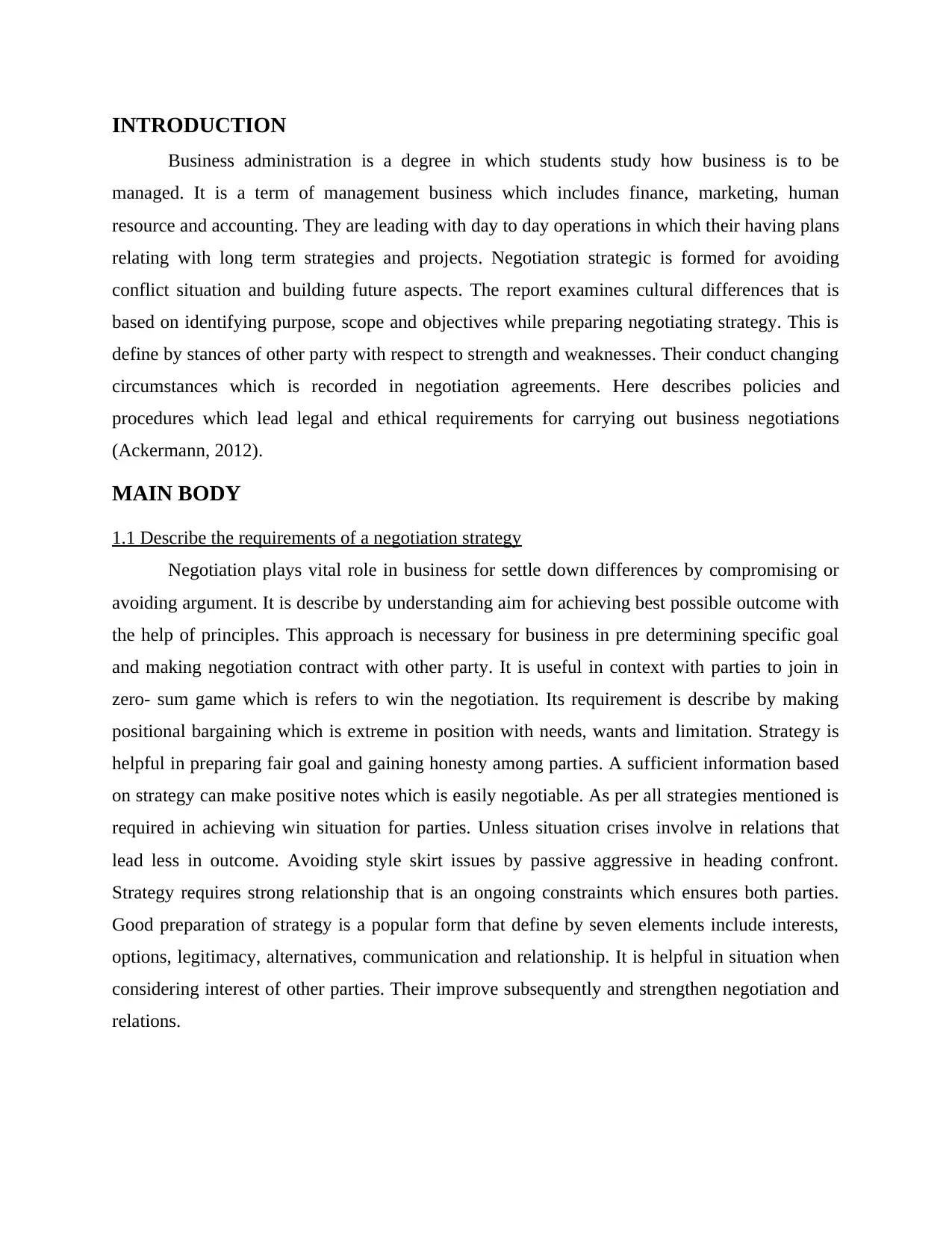
INTRODUCTION
Business administration is a degree in which students study how business is to be
managed. It is a term of management business which includes finance, marketing, human
resource and accounting. They are leading with day to day operations in which their having plans
relating with long term strategies and projects. Negotiation strategic is formed for avoiding
conflict situation and building future aspects. The report examines cultural differences that is
based on identifying purpose, scope and objectives while preparing negotiating strategy. This is
define by stances of other party with respect to strength and weaknesses. Their conduct changing
circumstances which is recorded in negotiation agreements. Here describes policies and
procedures which lead legal and ethical requirements for carrying out business negotiations
(Ackermann, 2012).
MAIN BODY
1.1 Describe the requirements of a negotiation strategy
Negotiation plays vital role in business for settle down differences by compromising or
avoiding argument. It is describe by understanding aim for achieving best possible outcome with
the help of principles. This approach is necessary for business in pre determining specific goal
and making negotiation contract with other party. It is useful in context with parties to join in
zero- sum game which is refers to win the negotiation. Its requirement is describe by making
positional bargaining which is extreme in position with needs, wants and limitation. Strategy is
helpful in preparing fair goal and gaining honesty among parties. A sufficient information based
on strategy can make positive notes which is easily negotiable. As per all strategies mentioned is
required in achieving win situation for parties. Unless situation crises involve in relations that
lead less in outcome. Avoiding style skirt issues by passive aggressive in heading confront.
Strategy requires strong relationship that is an ongoing constraints which ensures both parties.
Good preparation of strategy is a popular form that define by seven elements include interests,
options, legitimacy, alternatives, communication and relationship. It is helpful in situation when
considering interest of other parties. Their improve subsequently and strengthen negotiation and
relations.
Business administration is a degree in which students study how business is to be
managed. It is a term of management business which includes finance, marketing, human
resource and accounting. They are leading with day to day operations in which their having plans
relating with long term strategies and projects. Negotiation strategic is formed for avoiding
conflict situation and building future aspects. The report examines cultural differences that is
based on identifying purpose, scope and objectives while preparing negotiating strategy. This is
define by stances of other party with respect to strength and weaknesses. Their conduct changing
circumstances which is recorded in negotiation agreements. Here describes policies and
procedures which lead legal and ethical requirements for carrying out business negotiations
(Ackermann, 2012).
MAIN BODY
1.1 Describe the requirements of a negotiation strategy
Negotiation plays vital role in business for settle down differences by compromising or
avoiding argument. It is describe by understanding aim for achieving best possible outcome with
the help of principles. This approach is necessary for business in pre determining specific goal
and making negotiation contract with other party. It is useful in context with parties to join in
zero- sum game which is refers to win the negotiation. Its requirement is describe by making
positional bargaining which is extreme in position with needs, wants and limitation. Strategy is
helpful in preparing fair goal and gaining honesty among parties. A sufficient information based
on strategy can make positive notes which is easily negotiable. As per all strategies mentioned is
required in achieving win situation for parties. Unless situation crises involve in relations that
lead less in outcome. Avoiding style skirt issues by passive aggressive in heading confront.
Strategy requires strong relationship that is an ongoing constraints which ensures both parties.
Good preparation of strategy is a popular form that define by seven elements include interests,
options, legitimacy, alternatives, communication and relationship. It is helpful in situation when
considering interest of other parties. Their improve subsequently and strengthen negotiation and
relations.
⊘ This is a preview!⊘
Do you want full access?
Subscribe today to unlock all pages.

Trusted by 1+ million students worldwide
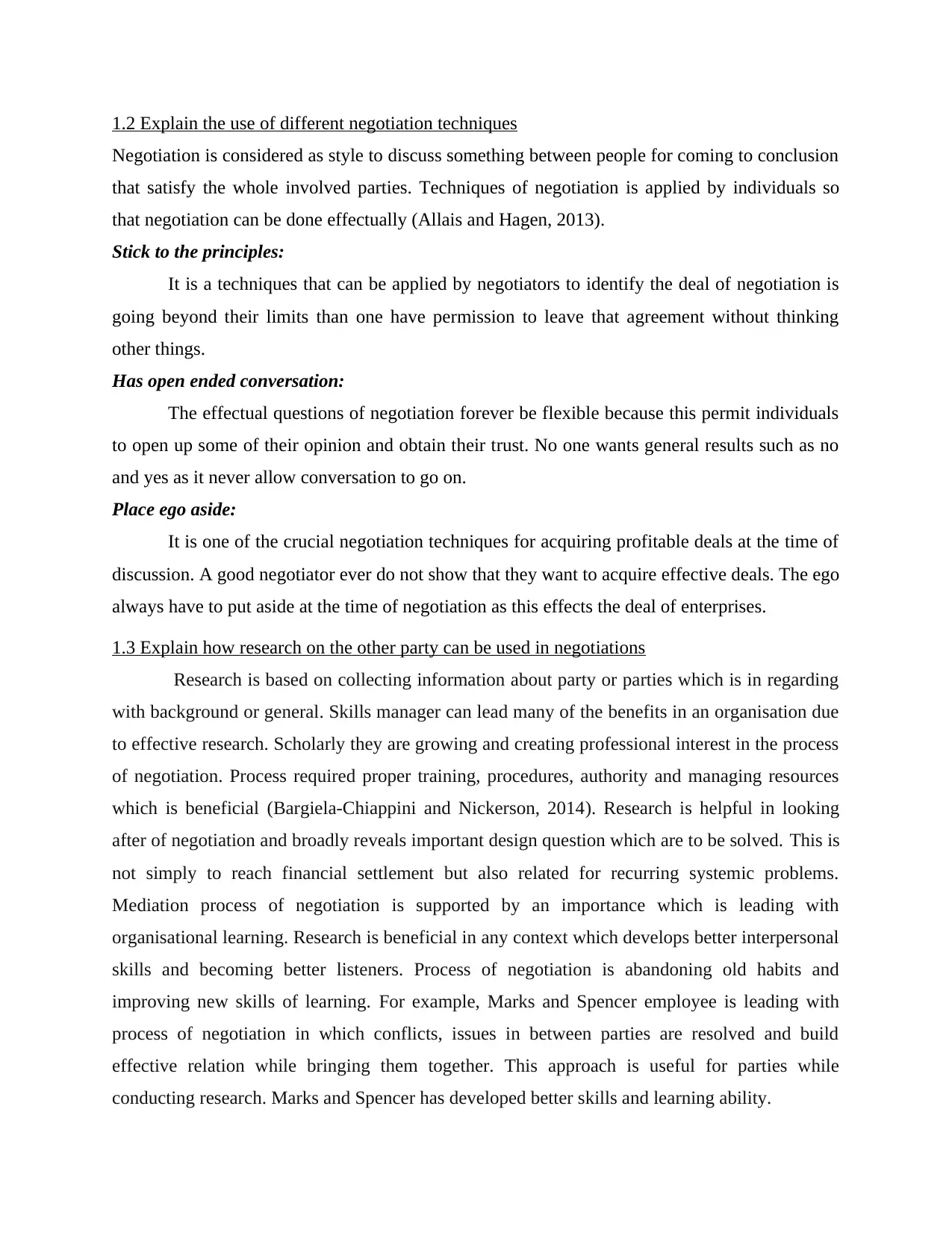
1.2 Explain the use of different negotiation techniques
Negotiation is considered as style to discuss something between people for coming to conclusion
that satisfy the whole involved parties. Techniques of negotiation is applied by individuals so
that negotiation can be done effectually (Allais and Hagen, 2013).
Stick to the principles:
It is a techniques that can be applied by negotiators to identify the deal of negotiation is
going beyond their limits than one have permission to leave that agreement without thinking
other things.
Has open ended conversation:
The effectual questions of negotiation forever be flexible because this permit individuals
to open up some of their opinion and obtain their trust. No one wants general results such as no
and yes as it never allow conversation to go on.
Place ego aside:
It is one of the crucial negotiation techniques for acquiring profitable deals at the time of
discussion. A good negotiator ever do not show that they want to acquire effective deals. The ego
always have to put aside at the time of negotiation as this effects the deal of enterprises.
1.3 Explain how research on the other party can be used in negotiations
Research is based on collecting information about party or parties which is in regarding
with background or general. Skills manager can lead many of the benefits in an organisation due
to effective research. Scholarly they are growing and creating professional interest in the process
of negotiation. Process required proper training, procedures, authority and managing resources
which is beneficial (Bargiela-Chiappini and Nickerson, 2014). Research is helpful in looking
after of negotiation and broadly reveals important design question which are to be solved. This is
not simply to reach financial settlement but also related for recurring systemic problems.
Mediation process of negotiation is supported by an importance which is leading with
organisational learning. Research is beneficial in any context which develops better interpersonal
skills and becoming better listeners. Process of negotiation is abandoning old habits and
improving new skills of learning. For example, Marks and Spencer employee is leading with
process of negotiation in which conflicts, issues in between parties are resolved and build
effective relation while bringing them together. This approach is useful for parties while
conducting research. Marks and Spencer has developed better skills and learning ability.
Negotiation is considered as style to discuss something between people for coming to conclusion
that satisfy the whole involved parties. Techniques of negotiation is applied by individuals so
that negotiation can be done effectually (Allais and Hagen, 2013).
Stick to the principles:
It is a techniques that can be applied by negotiators to identify the deal of negotiation is
going beyond their limits than one have permission to leave that agreement without thinking
other things.
Has open ended conversation:
The effectual questions of negotiation forever be flexible because this permit individuals
to open up some of their opinion and obtain their trust. No one wants general results such as no
and yes as it never allow conversation to go on.
Place ego aside:
It is one of the crucial negotiation techniques for acquiring profitable deals at the time of
discussion. A good negotiator ever do not show that they want to acquire effective deals. The ego
always have to put aside at the time of negotiation as this effects the deal of enterprises.
1.3 Explain how research on the other party can be used in negotiations
Research is based on collecting information about party or parties which is in regarding
with background or general. Skills manager can lead many of the benefits in an organisation due
to effective research. Scholarly they are growing and creating professional interest in the process
of negotiation. Process required proper training, procedures, authority and managing resources
which is beneficial (Bargiela-Chiappini and Nickerson, 2014). Research is helpful in looking
after of negotiation and broadly reveals important design question which are to be solved. This is
not simply to reach financial settlement but also related for recurring systemic problems.
Mediation process of negotiation is supported by an importance which is leading with
organisational learning. Research is beneficial in any context which develops better interpersonal
skills and becoming better listeners. Process of negotiation is abandoning old habits and
improving new skills of learning. For example, Marks and Spencer employee is leading with
process of negotiation in which conflicts, issues in between parties are resolved and build
effective relation while bringing them together. This approach is useful for parties while
conducting research. Marks and Spencer has developed better skills and learning ability.
Paraphrase This Document
Need a fresh take? Get an instant paraphrase of this document with our AI Paraphraser
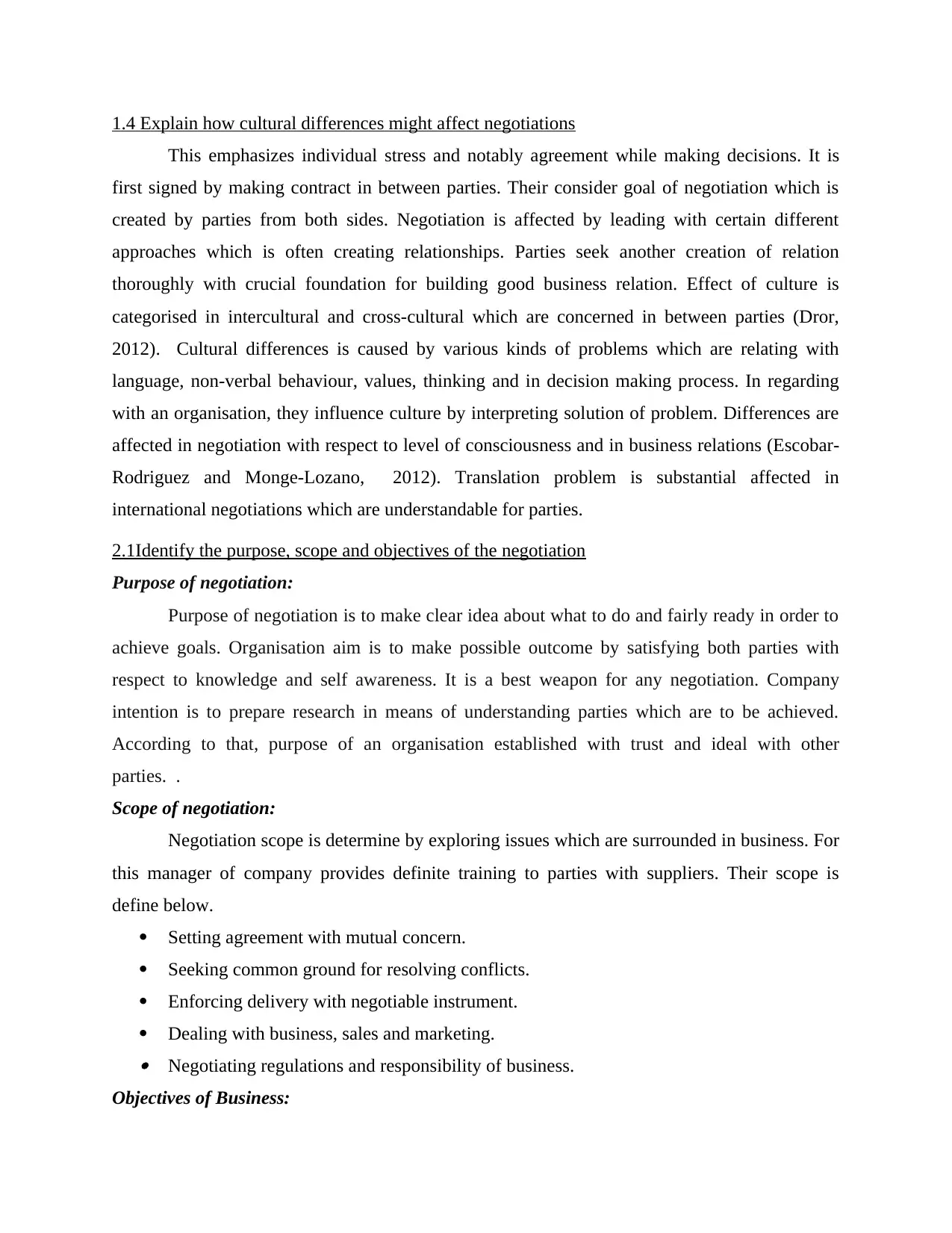
1.4 Explain how cultural differences might affect negotiations
This emphasizes individual stress and notably agreement while making decisions. It is
first signed by making contract in between parties. Their consider goal of negotiation which is
created by parties from both sides. Negotiation is affected by leading with certain different
approaches which is often creating relationships. Parties seek another creation of relation
thoroughly with crucial foundation for building good business relation. Effect of culture is
categorised in intercultural and cross-cultural which are concerned in between parties (Dror,
2012). Cultural differences is caused by various kinds of problems which are relating with
language, non-verbal behaviour, values, thinking and in decision making process. In regarding
with an organisation, they influence culture by interpreting solution of problem. Differences are
affected in negotiation with respect to level of consciousness and in business relations (Escobar-
Rodriguez and Monge-Lozano, 2012). Translation problem is substantial affected in
international negotiations which are understandable for parties.
2.1Identify the purpose, scope and objectives of the negotiation
Purpose of negotiation:
Purpose of negotiation is to make clear idea about what to do and fairly ready in order to
achieve goals. Organisation aim is to make possible outcome by satisfying both parties with
respect to knowledge and self awareness. It is a best weapon for any negotiation. Company
intention is to prepare research in means of understanding parties which are to be achieved.
According to that, purpose of an organisation established with trust and ideal with other
parties. .
Scope of negotiation:
Negotiation scope is determine by exploring issues which are surrounded in business. For
this manager of company provides definite training to parties with suppliers. Their scope is
define below.
Setting agreement with mutual concern.
Seeking common ground for resolving conflicts.
Enforcing delivery with negotiable instrument.
Dealing with business, sales and marketing. Negotiating regulations and responsibility of business.
Objectives of Business:
This emphasizes individual stress and notably agreement while making decisions. It is
first signed by making contract in between parties. Their consider goal of negotiation which is
created by parties from both sides. Negotiation is affected by leading with certain different
approaches which is often creating relationships. Parties seek another creation of relation
thoroughly with crucial foundation for building good business relation. Effect of culture is
categorised in intercultural and cross-cultural which are concerned in between parties (Dror,
2012). Cultural differences is caused by various kinds of problems which are relating with
language, non-verbal behaviour, values, thinking and in decision making process. In regarding
with an organisation, they influence culture by interpreting solution of problem. Differences are
affected in negotiation with respect to level of consciousness and in business relations (Escobar-
Rodriguez and Monge-Lozano, 2012). Translation problem is substantial affected in
international negotiations which are understandable for parties.
2.1Identify the purpose, scope and objectives of the negotiation
Purpose of negotiation:
Purpose of negotiation is to make clear idea about what to do and fairly ready in order to
achieve goals. Organisation aim is to make possible outcome by satisfying both parties with
respect to knowledge and self awareness. It is a best weapon for any negotiation. Company
intention is to prepare research in means of understanding parties which are to be achieved.
According to that, purpose of an organisation established with trust and ideal with other
parties. .
Scope of negotiation:
Negotiation scope is determine by exploring issues which are surrounded in business. For
this manager of company provides definite training to parties with suppliers. Their scope is
define below.
Setting agreement with mutual concern.
Seeking common ground for resolving conflicts.
Enforcing delivery with negotiable instrument.
Dealing with business, sales and marketing. Negotiating regulations and responsibility of business.
Objectives of Business:
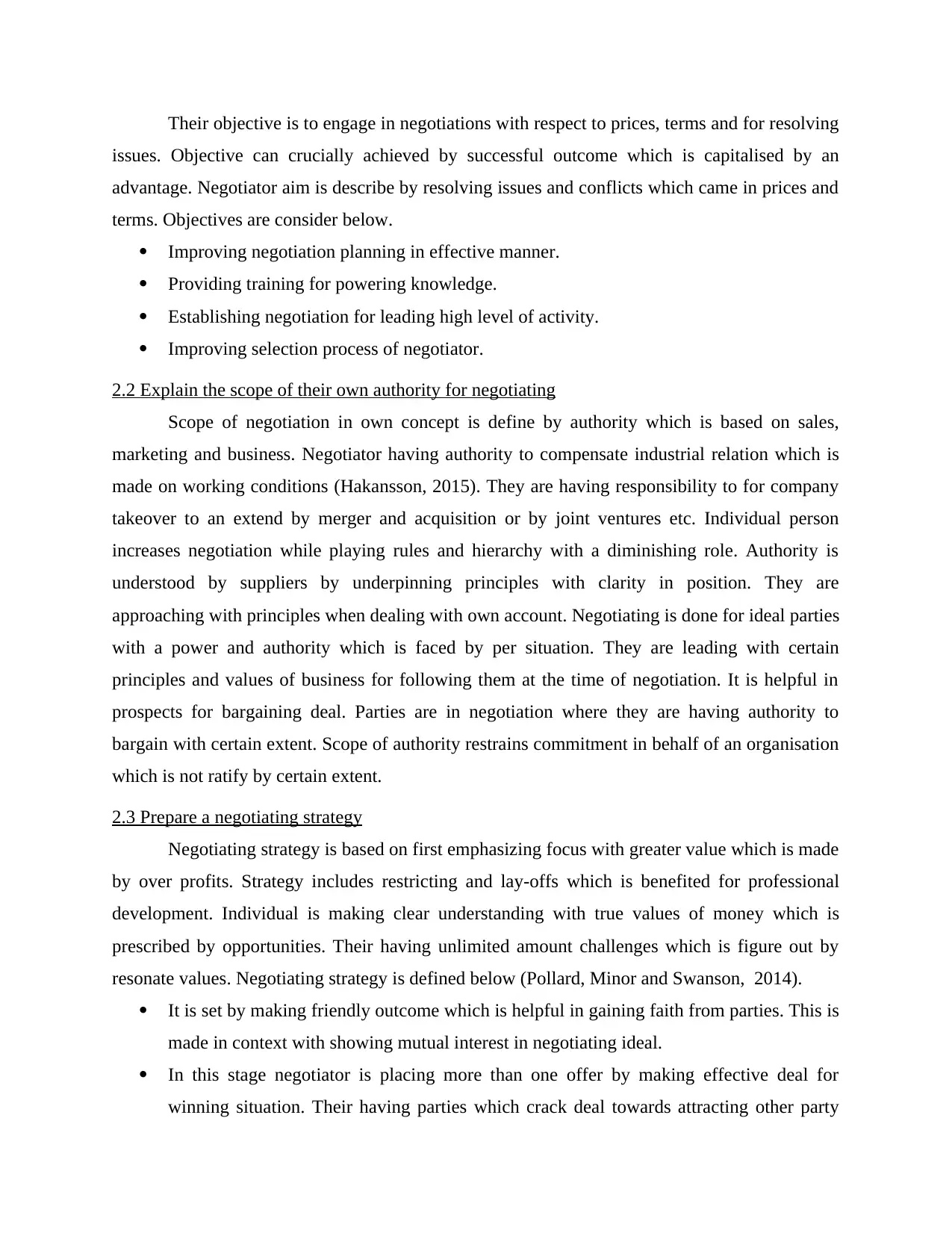
Their objective is to engage in negotiations with respect to prices, terms and for resolving
issues. Objective can crucially achieved by successful outcome which is capitalised by an
advantage. Negotiator aim is describe by resolving issues and conflicts which came in prices and
terms. Objectives are consider below.
Improving negotiation planning in effective manner.
Providing training for powering knowledge.
Establishing negotiation for leading high level of activity.
Improving selection process of negotiator.
2.2 Explain the scope of their own authority for negotiating
Scope of negotiation in own concept is define by authority which is based on sales,
marketing and business. Negotiator having authority to compensate industrial relation which is
made on working conditions (Hakansson, 2015). They are having responsibility to for company
takeover to an extend by merger and acquisition or by joint ventures etc. Individual person
increases negotiation while playing rules and hierarchy with a diminishing role. Authority is
understood by suppliers by underpinning principles with clarity in position. They are
approaching with principles when dealing with own account. Negotiating is done for ideal parties
with a power and authority which is faced by per situation. They are leading with certain
principles and values of business for following them at the time of negotiation. It is helpful in
prospects for bargaining deal. Parties are in negotiation where they are having authority to
bargain with certain extent. Scope of authority restrains commitment in behalf of an organisation
which is not ratify by certain extent.
2.3 Prepare a negotiating strategy
Negotiating strategy is based on first emphasizing focus with greater value which is made
by over profits. Strategy includes restricting and lay-offs which is benefited for professional
development. Individual is making clear understanding with true values of money which is
prescribed by opportunities. Their having unlimited amount challenges which is figure out by
resonate values. Negotiating strategy is defined below (Pollard, Minor and Swanson, 2014).
It is set by making friendly outcome which is helpful in gaining faith from parties. This is
made in context with showing mutual interest in negotiating ideal.
In this stage negotiator is placing more than one offer by making effective deal for
winning situation. Their having parties which crack deal towards attracting other party
issues. Objective can crucially achieved by successful outcome which is capitalised by an
advantage. Negotiator aim is describe by resolving issues and conflicts which came in prices and
terms. Objectives are consider below.
Improving negotiation planning in effective manner.
Providing training for powering knowledge.
Establishing negotiation for leading high level of activity.
Improving selection process of negotiator.
2.2 Explain the scope of their own authority for negotiating
Scope of negotiation in own concept is define by authority which is based on sales,
marketing and business. Negotiator having authority to compensate industrial relation which is
made on working conditions (Hakansson, 2015). They are having responsibility to for company
takeover to an extend by merger and acquisition or by joint ventures etc. Individual person
increases negotiation while playing rules and hierarchy with a diminishing role. Authority is
understood by suppliers by underpinning principles with clarity in position. They are
approaching with principles when dealing with own account. Negotiating is done for ideal parties
with a power and authority which is faced by per situation. They are leading with certain
principles and values of business for following them at the time of negotiation. It is helpful in
prospects for bargaining deal. Parties are in negotiation where they are having authority to
bargain with certain extent. Scope of authority restrains commitment in behalf of an organisation
which is not ratify by certain extent.
2.3 Prepare a negotiating strategy
Negotiating strategy is based on first emphasizing focus with greater value which is made
by over profits. Strategy includes restricting and lay-offs which is benefited for professional
development. Individual is making clear understanding with true values of money which is
prescribed by opportunities. Their having unlimited amount challenges which is figure out by
resonate values. Negotiating strategy is defined below (Pollard, Minor and Swanson, 2014).
It is set by making friendly outcome which is helpful in gaining faith from parties. This is
made in context with showing mutual interest in negotiating ideal.
In this stage negotiator is placing more than one offer by making effective deal for
winning situation. Their having parties which crack deal towards attracting other party
⊘ This is a preview!⊘
Do you want full access?
Subscribe today to unlock all pages.

Trusted by 1+ million students worldwide
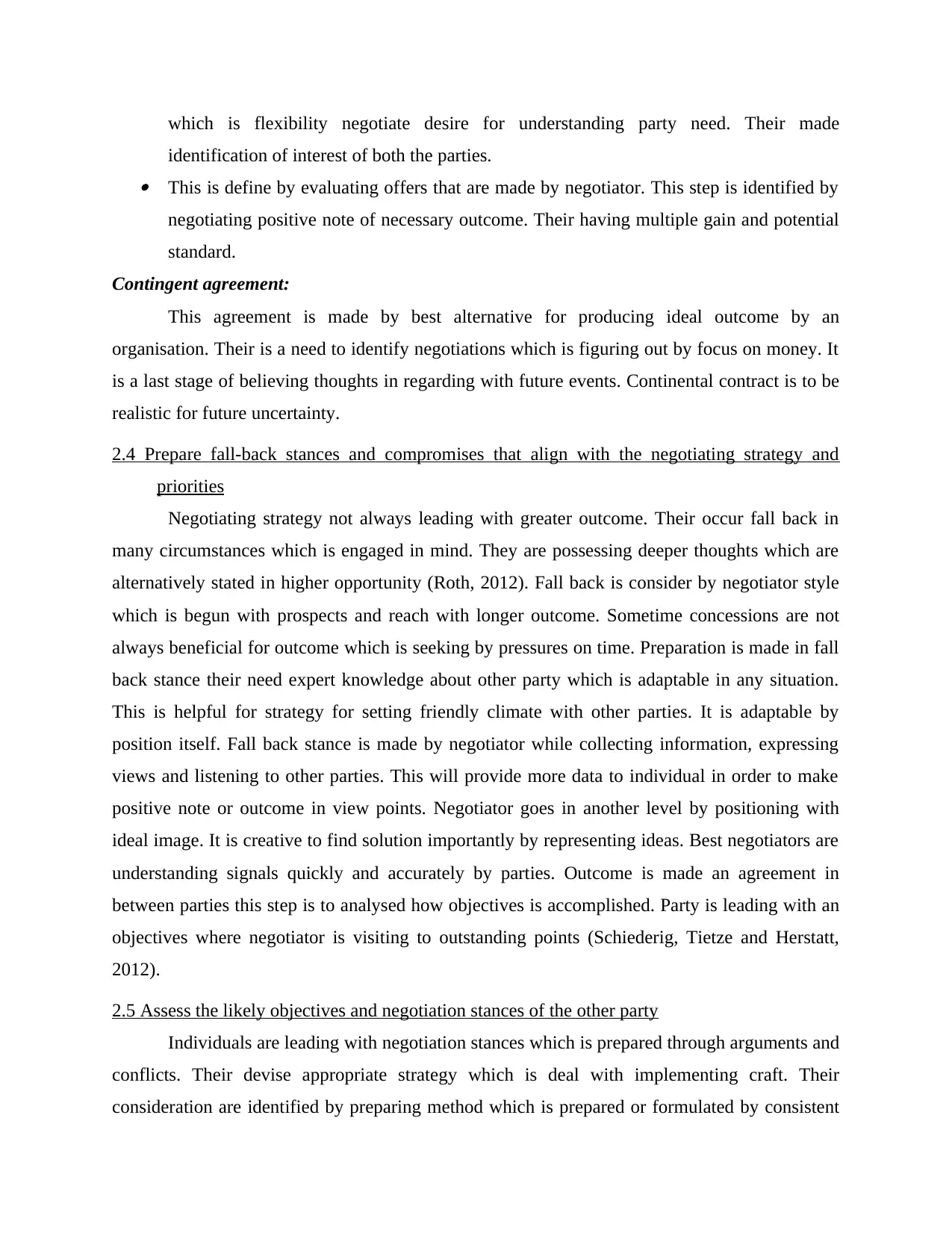
which is flexibility negotiate desire for understanding party need. Their made
identification of interest of both the parties. This is define by evaluating offers that are made by negotiator. This step is identified by
negotiating positive note of necessary outcome. Their having multiple gain and potential
standard.
Contingent agreement:
This agreement is made by best alternative for producing ideal outcome by an
organisation. Their is a need to identify negotiations which is figuring out by focus on money. It
is a last stage of believing thoughts in regarding with future events. Continental contract is to be
realistic for future uncertainty.
2.4 Prepare fall-back stances and compromises that align with the negotiating strategy and
priorities
Negotiating strategy not always leading with greater outcome. Their occur fall back in
many circumstances which is engaged in mind. They are possessing deeper thoughts which are
alternatively stated in higher opportunity (Roth, 2012). Fall back is consider by negotiator style
which is begun with prospects and reach with longer outcome. Sometime concessions are not
always beneficial for outcome which is seeking by pressures on time. Preparation is made in fall
back stance their need expert knowledge about other party which is adaptable in any situation.
This is helpful for strategy for setting friendly climate with other parties. It is adaptable by
position itself. Fall back stance is made by negotiator while collecting information, expressing
views and listening to other parties. This will provide more data to individual in order to make
positive note or outcome in view points. Negotiator goes in another level by positioning with
ideal image. It is creative to find solution importantly by representing ideas. Best negotiators are
understanding signals quickly and accurately by parties. Outcome is made an agreement in
between parties this step is to analysed how objectives is accomplished. Party is leading with an
objectives where negotiator is visiting to outstanding points (Schiederig, Tietze and Herstatt,
2012).
2.5 Assess the likely objectives and negotiation stances of the other party
Individuals are leading with negotiation stances which is prepared through arguments and
conflicts. Their devise appropriate strategy which is deal with implementing craft. Their
consideration are identified by preparing method which is prepared or formulated by consistent
identification of interest of both the parties. This is define by evaluating offers that are made by negotiator. This step is identified by
negotiating positive note of necessary outcome. Their having multiple gain and potential
standard.
Contingent agreement:
This agreement is made by best alternative for producing ideal outcome by an
organisation. Their is a need to identify negotiations which is figuring out by focus on money. It
is a last stage of believing thoughts in regarding with future events. Continental contract is to be
realistic for future uncertainty.
2.4 Prepare fall-back stances and compromises that align with the negotiating strategy and
priorities
Negotiating strategy not always leading with greater outcome. Their occur fall back in
many circumstances which is engaged in mind. They are possessing deeper thoughts which are
alternatively stated in higher opportunity (Roth, 2012). Fall back is consider by negotiator style
which is begun with prospects and reach with longer outcome. Sometime concessions are not
always beneficial for outcome which is seeking by pressures on time. Preparation is made in fall
back stance their need expert knowledge about other party which is adaptable in any situation.
This is helpful for strategy for setting friendly climate with other parties. It is adaptable by
position itself. Fall back stance is made by negotiator while collecting information, expressing
views and listening to other parties. This will provide more data to individual in order to make
positive note or outcome in view points. Negotiator goes in another level by positioning with
ideal image. It is creative to find solution importantly by representing ideas. Best negotiators are
understanding signals quickly and accurately by parties. Outcome is made an agreement in
between parties this step is to analysed how objectives is accomplished. Party is leading with an
objectives where negotiator is visiting to outstanding points (Schiederig, Tietze and Herstatt,
2012).
2.5 Assess the likely objectives and negotiation stances of the other party
Individuals are leading with negotiation stances which is prepared through arguments and
conflicts. Their devise appropriate strategy which is deal with implementing craft. Their
consideration are identified by preparing method which is prepared or formulated by consistent
Paraphrase This Document
Need a fresh take? Get an instant paraphrase of this document with our AI Paraphraser
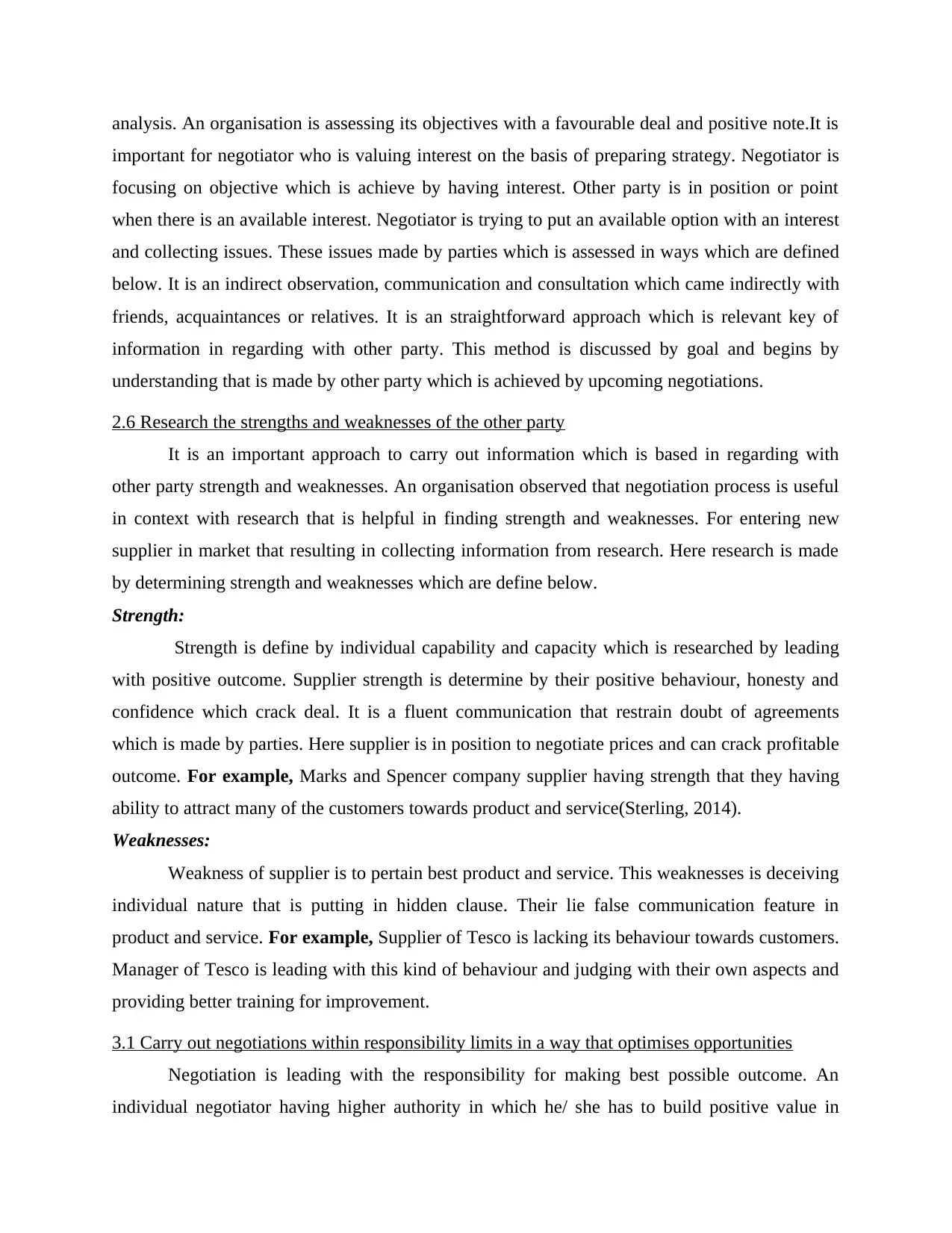
analysis. An organisation is assessing its objectives with a favourable deal and positive note.It is
important for negotiator who is valuing interest on the basis of preparing strategy. Negotiator is
focusing on objective which is achieve by having interest. Other party is in position or point
when there is an available interest. Negotiator is trying to put an available option with an interest
and collecting issues. These issues made by parties which is assessed in ways which are defined
below. It is an indirect observation, communication and consultation which came indirectly with
friends, acquaintances or relatives. It is an straightforward approach which is relevant key of
information in regarding with other party. This method is discussed by goal and begins by
understanding that is made by other party which is achieved by upcoming negotiations.
2.6 Research the strengths and weaknesses of the other party
It is an important approach to carry out information which is based in regarding with
other party strength and weaknesses. An organisation observed that negotiation process is useful
in context with research that is helpful in finding strength and weaknesses. For entering new
supplier in market that resulting in collecting information from research. Here research is made
by determining strength and weaknesses which are define below.
Strength:
Strength is define by individual capability and capacity which is researched by leading
with positive outcome. Supplier strength is determine by their positive behaviour, honesty and
confidence which crack deal. It is a fluent communication that restrain doubt of agreements
which is made by parties. Here supplier is in position to negotiate prices and can crack profitable
outcome. For example, Marks and Spencer company supplier having strength that they having
ability to attract many of the customers towards product and service(Sterling, 2014).
Weaknesses:
Weakness of supplier is to pertain best product and service. This weaknesses is deceiving
individual nature that is putting in hidden clause. Their lie false communication feature in
product and service. For example, Supplier of Tesco is lacking its behaviour towards customers.
Manager of Tesco is leading with this kind of behaviour and judging with their own aspects and
providing better training for improvement.
3.1 Carry out negotiations within responsibility limits in a way that optimises opportunities
Negotiation is leading with the responsibility for making best possible outcome. An
individual negotiator having higher authority in which he/ she has to build positive value in
important for negotiator who is valuing interest on the basis of preparing strategy. Negotiator is
focusing on objective which is achieve by having interest. Other party is in position or point
when there is an available interest. Negotiator is trying to put an available option with an interest
and collecting issues. These issues made by parties which is assessed in ways which are defined
below. It is an indirect observation, communication and consultation which came indirectly with
friends, acquaintances or relatives. It is an straightforward approach which is relevant key of
information in regarding with other party. This method is discussed by goal and begins by
understanding that is made by other party which is achieved by upcoming negotiations.
2.6 Research the strengths and weaknesses of the other party
It is an important approach to carry out information which is based in regarding with
other party strength and weaknesses. An organisation observed that negotiation process is useful
in context with research that is helpful in finding strength and weaknesses. For entering new
supplier in market that resulting in collecting information from research. Here research is made
by determining strength and weaknesses which are define below.
Strength:
Strength is define by individual capability and capacity which is researched by leading
with positive outcome. Supplier strength is determine by their positive behaviour, honesty and
confidence which crack deal. It is a fluent communication that restrain doubt of agreements
which is made by parties. Here supplier is in position to negotiate prices and can crack profitable
outcome. For example, Marks and Spencer company supplier having strength that they having
ability to attract many of the customers towards product and service(Sterling, 2014).
Weaknesses:
Weakness of supplier is to pertain best product and service. This weaknesses is deceiving
individual nature that is putting in hidden clause. Their lie false communication feature in
product and service. For example, Supplier of Tesco is lacking its behaviour towards customers.
Manager of Tesco is leading with this kind of behaviour and judging with their own aspects and
providing better training for improvement.
3.1 Carry out negotiations within responsibility limits in a way that optimises opportunities
Negotiation is leading with the responsibility for making best possible outcome. An
individual negotiator having higher authority in which he/ she has to build positive value in
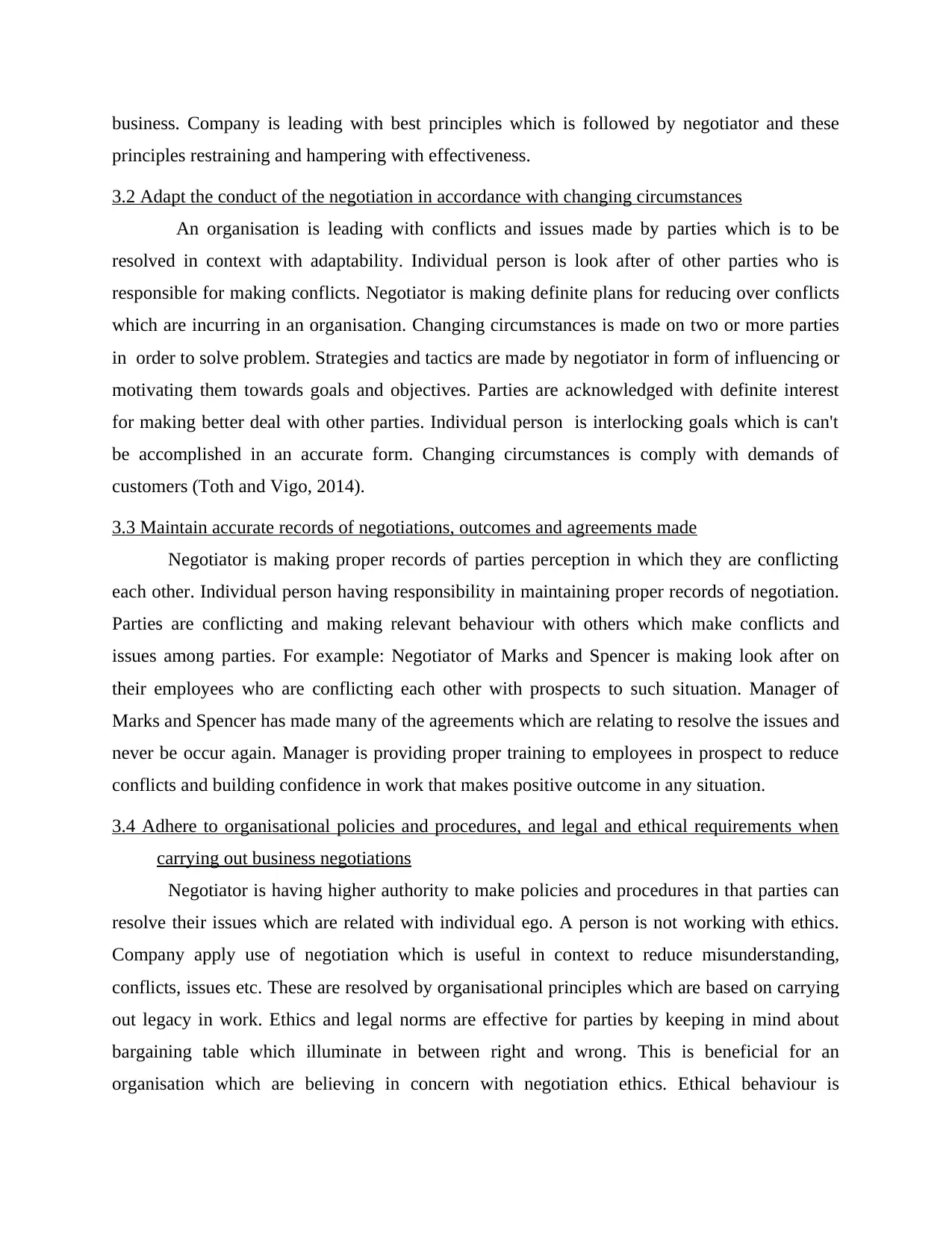
business. Company is leading with best principles which is followed by negotiator and these
principles restraining and hampering with effectiveness.
3.2 Adapt the conduct of the negotiation in accordance with changing circumstances
An organisation is leading with conflicts and issues made by parties which is to be
resolved in context with adaptability. Individual person is look after of other parties who is
responsible for making conflicts. Negotiator is making definite plans for reducing over conflicts
which are incurring in an organisation. Changing circumstances is made on two or more parties
in order to solve problem. Strategies and tactics are made by negotiator in form of influencing or
motivating them towards goals and objectives. Parties are acknowledged with definite interest
for making better deal with other parties. Individual person is interlocking goals which is can't
be accomplished in an accurate form. Changing circumstances is comply with demands of
customers (Toth and Vigo, 2014).
3.3 Maintain accurate records of negotiations, outcomes and agreements made
Negotiator is making proper records of parties perception in which they are conflicting
each other. Individual person having responsibility in maintaining proper records of negotiation.
Parties are conflicting and making relevant behaviour with others which make conflicts and
issues among parties. For example: Negotiator of Marks and Spencer is making look after on
their employees who are conflicting each other with prospects to such situation. Manager of
Marks and Spencer has made many of the agreements which are relating to resolve the issues and
never be occur again. Manager is providing proper training to employees in prospect to reduce
conflicts and building confidence in work that makes positive outcome in any situation.
3.4 Adhere to organisational policies and procedures, and legal and ethical requirements when
carrying out business negotiations
Negotiator is having higher authority to make policies and procedures in that parties can
resolve their issues which are related with individual ego. A person is not working with ethics.
Company apply use of negotiation which is useful in context to reduce misunderstanding,
conflicts, issues etc. These are resolved by organisational principles which are based on carrying
out legacy in work. Ethics and legal norms are effective for parties by keeping in mind about
bargaining table which illuminate in between right and wrong. This is beneficial for an
organisation which are believing in concern with negotiation ethics. Ethical behaviour is
principles restraining and hampering with effectiveness.
3.2 Adapt the conduct of the negotiation in accordance with changing circumstances
An organisation is leading with conflicts and issues made by parties which is to be
resolved in context with adaptability. Individual person is look after of other parties who is
responsible for making conflicts. Negotiator is making definite plans for reducing over conflicts
which are incurring in an organisation. Changing circumstances is made on two or more parties
in order to solve problem. Strategies and tactics are made by negotiator in form of influencing or
motivating them towards goals and objectives. Parties are acknowledged with definite interest
for making better deal with other parties. Individual person is interlocking goals which is can't
be accomplished in an accurate form. Changing circumstances is comply with demands of
customers (Toth and Vigo, 2014).
3.3 Maintain accurate records of negotiations, outcomes and agreements made
Negotiator is making proper records of parties perception in which they are conflicting
each other. Individual person having responsibility in maintaining proper records of negotiation.
Parties are conflicting and making relevant behaviour with others which make conflicts and
issues among parties. For example: Negotiator of Marks and Spencer is making look after on
their employees who are conflicting each other with prospects to such situation. Manager of
Marks and Spencer has made many of the agreements which are relating to resolve the issues and
never be occur again. Manager is providing proper training to employees in prospect to reduce
conflicts and building confidence in work that makes positive outcome in any situation.
3.4 Adhere to organisational policies and procedures, and legal and ethical requirements when
carrying out business negotiations
Negotiator is having higher authority to make policies and procedures in that parties can
resolve their issues which are related with individual ego. A person is not working with ethics.
Company apply use of negotiation which is useful in context to reduce misunderstanding,
conflicts, issues etc. These are resolved by organisational principles which are based on carrying
out legacy in work. Ethics and legal norms are effective for parties by keeping in mind about
bargaining table which illuminate in between right and wrong. This is beneficial for an
organisation which are believing in concern with negotiation ethics. Ethical behaviour is
⊘ This is a preview!⊘
Do you want full access?
Subscribe today to unlock all pages.

Trusted by 1+ million students worldwide
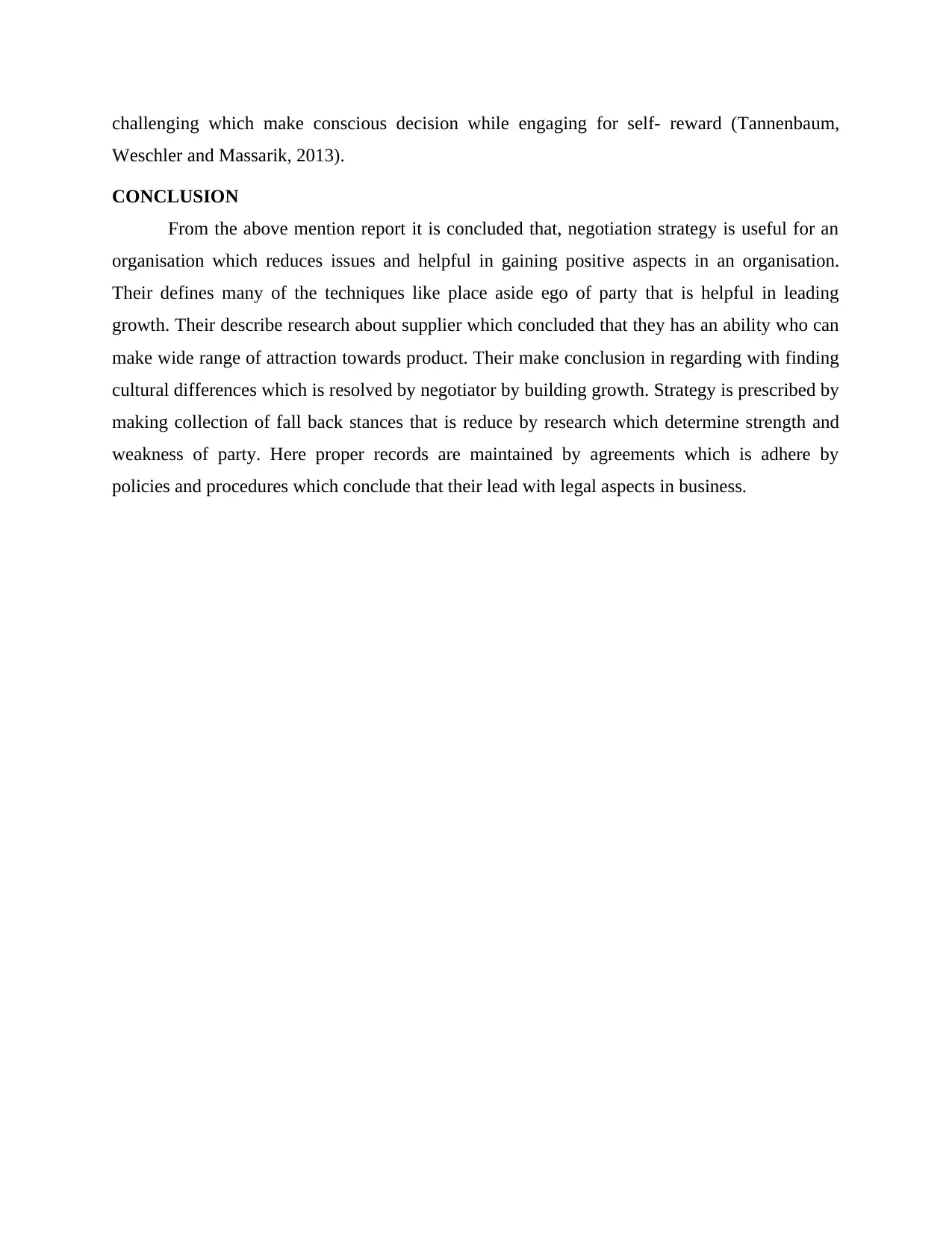
challenging which make conscious decision while engaging for self- reward (Tannenbaum,
Weschler and Massarik, 2013).
CONCLUSION
From the above mention report it is concluded that, negotiation strategy is useful for an
organisation which reduces issues and helpful in gaining positive aspects in an organisation.
Their defines many of the techniques like place aside ego of party that is helpful in leading
growth. Their describe research about supplier which concluded that they has an ability who can
make wide range of attraction towards product. Their make conclusion in regarding with finding
cultural differences which is resolved by negotiator by building growth. Strategy is prescribed by
making collection of fall back stances that is reduce by research which determine strength and
weakness of party. Here proper records are maintained by agreements which is adhere by
policies and procedures which conclude that their lead with legal aspects in business.
Weschler and Massarik, 2013).
CONCLUSION
From the above mention report it is concluded that, negotiation strategy is useful for an
organisation which reduces issues and helpful in gaining positive aspects in an organisation.
Their defines many of the techniques like place aside ego of party that is helpful in leading
growth. Their describe research about supplier which concluded that they has an ability who can
make wide range of attraction towards product. Their make conclusion in regarding with finding
cultural differences which is resolved by negotiator by building growth. Strategy is prescribed by
making collection of fall back stances that is reduce by research which determine strength and
weakness of party. Here proper records are maintained by agreements which is adhere by
policies and procedures which conclude that their lead with legal aspects in business.
Paraphrase This Document
Need a fresh take? Get an instant paraphrase of this document with our AI Paraphraser
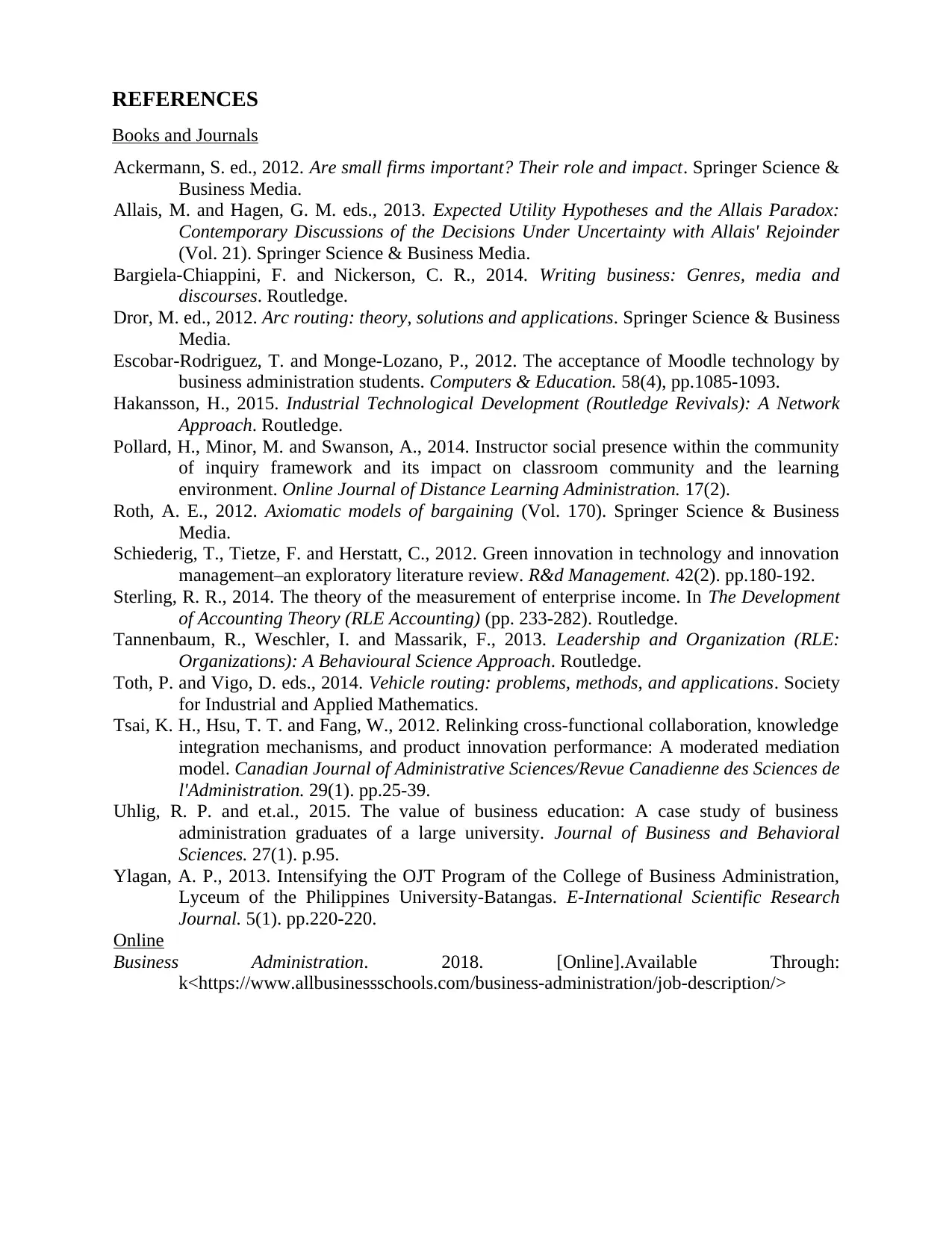
REFERENCES
Books and Journals
Ackermann, S. ed., 2012. Are small firms important? Their role and impact. Springer Science &
Business Media.
Allais, M. and Hagen, G. M. eds., 2013. Expected Utility Hypotheses and the Allais Paradox:
Contemporary Discussions of the Decisions Under Uncertainty with Allais' Rejoinder
(Vol. 21). Springer Science & Business Media.
Bargiela-Chiappini, F. and Nickerson, C. R., 2014. Writing business: Genres, media and
discourses. Routledge.
Dror, M. ed., 2012. Arc routing: theory, solutions and applications. Springer Science & Business
Media.
Escobar-Rodriguez, T. and Monge-Lozano, P., 2012. The acceptance of Moodle technology by
business administration students. Computers & Education. 58(4), pp.1085-1093.
Hakansson, H., 2015. Industrial Technological Development (Routledge Revivals): A Network
Approach. Routledge.
Pollard, H., Minor, M. and Swanson, A., 2014. Instructor social presence within the community
of inquiry framework and its impact on classroom community and the learning
environment. Online Journal of Distance Learning Administration. 17(2).
Roth, A. E., 2012. Axiomatic models of bargaining (Vol. 170). Springer Science & Business
Media.
Schiederig, T., Tietze, F. and Herstatt, C., 2012. Green innovation in technology and innovation
management–an exploratory literature review. R&d Management. 42(2). pp.180-192.
Sterling, R. R., 2014. The theory of the measurement of enterprise income. In The Development
of Accounting Theory (RLE Accounting) (pp. 233-282). Routledge.
Tannenbaum, R., Weschler, I. and Massarik, F., 2013. Leadership and Organization (RLE:
Organizations): A Behavioural Science Approach. Routledge.
Toth, P. and Vigo, D. eds., 2014. Vehicle routing: problems, methods, and applications. Society
for Industrial and Applied Mathematics.
Tsai, K. H., Hsu, T. T. and Fang, W., 2012. Relinking cross‐functional collaboration, knowledge
integration mechanisms, and product innovation performance: A moderated mediation
model. Canadian Journal of Administrative Sciences/Revue Canadienne des Sciences de
l'Administration. 29(1). pp.25-39.
Uhlig, R. P. and et.al., 2015. The value of business education: A case study of business
administration graduates of a large university. Journal of Business and Behavioral
Sciences. 27(1). p.95.
Ylagan, A. P., 2013. Intensifying the OJT Program of the College of Business Administration,
Lyceum of the Philippines University-Batangas. E-International Scientific Research
Journal. 5(1). pp.220-220.
Online
Business Administration. 2018. [Online].Available Through:
k<https://www.allbusinessschools.com/business-administration/job-description/>
Books and Journals
Ackermann, S. ed., 2012. Are small firms important? Their role and impact. Springer Science &
Business Media.
Allais, M. and Hagen, G. M. eds., 2013. Expected Utility Hypotheses and the Allais Paradox:
Contemporary Discussions of the Decisions Under Uncertainty with Allais' Rejoinder
(Vol. 21). Springer Science & Business Media.
Bargiela-Chiappini, F. and Nickerson, C. R., 2014. Writing business: Genres, media and
discourses. Routledge.
Dror, M. ed., 2012. Arc routing: theory, solutions and applications. Springer Science & Business
Media.
Escobar-Rodriguez, T. and Monge-Lozano, P., 2012. The acceptance of Moodle technology by
business administration students. Computers & Education. 58(4), pp.1085-1093.
Hakansson, H., 2015. Industrial Technological Development (Routledge Revivals): A Network
Approach. Routledge.
Pollard, H., Minor, M. and Swanson, A., 2014. Instructor social presence within the community
of inquiry framework and its impact on classroom community and the learning
environment. Online Journal of Distance Learning Administration. 17(2).
Roth, A. E., 2012. Axiomatic models of bargaining (Vol. 170). Springer Science & Business
Media.
Schiederig, T., Tietze, F. and Herstatt, C., 2012. Green innovation in technology and innovation
management–an exploratory literature review. R&d Management. 42(2). pp.180-192.
Sterling, R. R., 2014. The theory of the measurement of enterprise income. In The Development
of Accounting Theory (RLE Accounting) (pp. 233-282). Routledge.
Tannenbaum, R., Weschler, I. and Massarik, F., 2013. Leadership and Organization (RLE:
Organizations): A Behavioural Science Approach. Routledge.
Toth, P. and Vigo, D. eds., 2014. Vehicle routing: problems, methods, and applications. Society
for Industrial and Applied Mathematics.
Tsai, K. H., Hsu, T. T. and Fang, W., 2012. Relinking cross‐functional collaboration, knowledge
integration mechanisms, and product innovation performance: A moderated mediation
model. Canadian Journal of Administrative Sciences/Revue Canadienne des Sciences de
l'Administration. 29(1). pp.25-39.
Uhlig, R. P. and et.al., 2015. The value of business education: A case study of business
administration graduates of a large university. Journal of Business and Behavioral
Sciences. 27(1). p.95.
Ylagan, A. P., 2013. Intensifying the OJT Program of the College of Business Administration,
Lyceum of the Philippines University-Batangas. E-International Scientific Research
Journal. 5(1). pp.220-220.
Online
Business Administration. 2018. [Online].Available Through:
k<https://www.allbusinessschools.com/business-administration/job-description/>

⊘ This is a preview!⊘
Do you want full access?
Subscribe today to unlock all pages.

Trusted by 1+ million students worldwide
1 out of 12
Related Documents
Your All-in-One AI-Powered Toolkit for Academic Success.
+13062052269
info@desklib.com
Available 24*7 on WhatsApp / Email
![[object Object]](/_next/static/media/star-bottom.7253800d.svg)
Unlock your academic potential
Copyright © 2020–2026 A2Z Services. All Rights Reserved. Developed and managed by ZUCOL.





